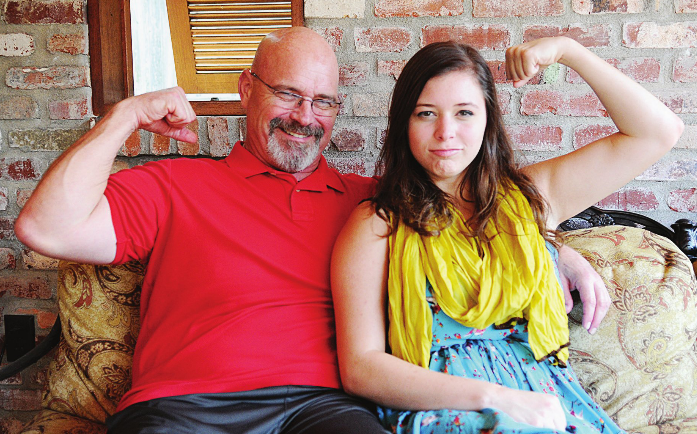They tell you when you get to college that it’s a time to get drunk with your friends and stay up all night chugging Starbucks before exams and date around and enjoy your last few years of freedom before the real world comes.
And yeah, it is. But for some of us, the real world comes a lot earlier than our graduation date. My own graduation is coming up this month, and looking back, I can see how many opportunities I had — taken and missed — to help someone trying to deal with something like me.
In the secret language and history of my family — my warm, noisy, beautiful, dysfunctional, most-important-thing-in-the-world family — birthdays have always been sacred. I remember every birthday party from age 3 to now, all lined up in my head. At the end of the row is 22 and an ICU waiting room and the words “14 months.”
My dad was diagnosed with stage four brain cancer on my 22nd birthday.
The first few months were the worst. I couldn’t feel much of anything else, couldn’t connect or relate to anyone around me, no matter how much I tried to force it. Everything everyone else cared about felt pointless and trivial to me.
I wasn’t OK, but the guilt of putting that weight on other people made me feel even worse, and it wasn’t like there was anything anyone could really do to help.
So I just sucked it up and faked it. I stopped eating, stopped sleeping, kept moving.
It was, and still is sometimes, incredibly isolating to feel like everyone else your age is on a wavelength you can’t even access anymore. For a while, I was pretty convinced that I’d lost the ability to connect with anyone or trust my own feelings about anything.
But it’s been almost a year since the diagnosis now, and the further I get into this, the more I’ve learned that I’m not really alone.
I know people my age who have already fought cancer themselves. I have friends who’ve been abused, who’ve lost parents, siblings, best friends. I know people struggling with who they are and how to break it to their family, people whose lives have completely changed since they got to college.
And I can see now, and only now, exactly what the best course of action in the moments I had with those people would have been.
If you have friends who are trying to make it through college while dealing with something huge, listen to them. Listen to what they need, even if they don’t say it. Don’t just tell them it’s going to be OK, because sometimes it isn’t, and sometimes hearing those words just feels like salt in the wound.
Take your cues from them. Sometimes they will need you to give them feedback when they vent, and sometimes they just need you to nod and pass them a drink.
Sometimes it just means sitting with them all day keeping them occupied with Netflix while they wait for that phone call. Sometimes it means reminding them that they need to study and pass this exam or they’re totally screwed for the semester. They may not ask you specifically, because to them it can feel like a surrender. Don’t push unless necessary, but don’t let them go either. Make yourself available. Create a safe space, and they’ll open up to you.
If they do ask for help, don’t put it off. When someone is walking around with something that heavy all the time, it can be hard to let their guard down for anyone; a need that is expressed is usually a need that is urgent. Don’t ignore it.
Most of all, be patient, because all of those people are operating at 300 percent capacity every moment of the day just to stay alive and sane, so they won’t always be rational or tactful or emotionally competent.
And don’t get freaked out if they cry a lot. It happens.
For those going through something like this, well, I can only speak from my own personal experience. But what I’ve learned over the past year is that you’re almost never as alone as you feel.
Take care of yourself. Listen to your own needs in every moment and make it a priority to find a way to meet them. Being strong doesn’t mean doing everything perfectly or starving yourself of what you need to feel better right now. Accepting help is not giving up.
Don’t be ashamed of needing a mental health day or week or semester. Sometimes you need to go to class and focus on a lecture for an hour. Sometimes you need to skip to buy yourself $8 worth of frozen yogurt with candy on top and eat it in your car.
Find an anchor. Set a weekly lunch date with a friend, call your mom every day, find a therapist who helps you and keep a regular appointment. The simple act of having something or someone outside of yourself to ground you will help more than you think. Keep up with it. If nothing else, it’ll keep you from isolating yourself more than is good for you.
Don’t lose hope for yourself. You’re not broken, at least not permanently. There’s still room somewhere in there to be better. To love and accept love when it finds you. To do something that matters.
As for me, I’m turning 23 in January, and I’m doing much better. I’ve found ways to make this work. My dad is set to outlive his prognosis right now, and my family is sticking together.
It’s not easy, of course. It’s never easy. But I’ve learned how to have a full and happy life with the people I love, even with all of this. Happiness is not necessarily conditional. You can make it yourself.
Everybody’s got something they’re carrying. Share the load. Take care of each other, LSU.
Kaci Yoder is a 22-year-old mass communication senior from Baton Rouge.
You are not alone: Students should help each other, themselves during times of personal crisis
By Kaci Yoder
December 3, 2013
Kaci Yoder (right) sits with her dad (left) at their home in Baton Rouge. Kaci urges students to listen and support their friends and peers during difficult times.






